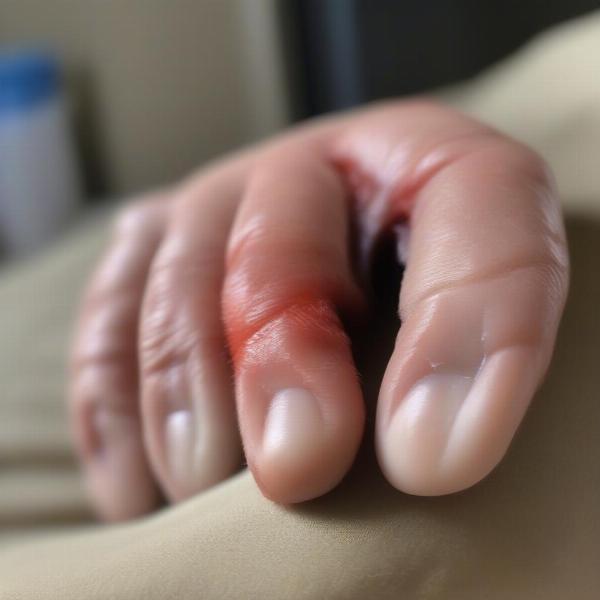Spider bites on dogs are a relatively common occurrence, especially during warmer months when spiders are more active. While most spider bites are harmless, causing only minor irritation, some can be dangerous, even fatal, if left untreated. Being able to identify a spider bite and understanding the potential risks is crucial for every dog owner. This article will provide you with valuable information on how to identify spider bites, understand the symptoms, and take appropriate action to protect your furry friend.
Identifying a Spider Bite on Your Dog
Identifying a spider bite can be tricky as they often resemble other skin irritations. Look for small, red bumps or lesions, often appearing in pairs. The area around the bite may be swollen, red, and painful to the touch. Sometimes, a small blister or ulcer may form. Unlike insect bites that often itch, spider bites tend to cause more pain than itching. The location of the bite can also offer a clue. Bites on areas with less fur, like the belly or groin, are more likely to be noticed.
Symptoms of Spider Bites in Dogs
The severity of symptoms varies depending on the spider species, the amount of venom injected, and the dog’s individual sensitivity. Mild reactions may include localized pain, swelling, and redness. More severe reactions can involve vomiting, diarrhea, fever, muscle weakness, tremors, difficulty breathing, and even paralysis.  Dog with a swollen paw from a spider bite In the case of highly venomous spiders like the black widow or brown recluse, the bite can lead to tissue damage, organ failure, and death.
Dog with a swollen paw from a spider bite In the case of highly venomous spiders like the black widow or brown recluse, the bite can lead to tissue damage, organ failure, and death.
What to Do If You Suspect a Spider Bite
If you suspect your dog has been bitten by a spider, it’s essential to act quickly. First, try to identify the spider if possible, as this will help your veterinarian determine the best course of treatment. Take a photo if you can do so safely. Next, contact your veterinarian immediately. Even if the symptoms seem mild, it’s crucial to seek professional advice. While waiting for veterinary care, you can gently clean the bite area with mild soap and water. Applying a cool compress can help reduce swelling and pain. Do not attempt to squeeze or lance the bite, as this can worsen the situation.
Preventing Spider Bites
Preventing spider bites is the best way to protect your dog. Regularly inspect your home and yard for spiders and their webs, paying particular attention to dark, secluded areas. Keep woodpiles, debris, and tall grass away from your house. Vacuum regularly and seal cracks and crevices that spiders may use as entry points. When hiking or camping, keep your dog on a leash and avoid areas with dense vegetation. Consider using pet-safe spider repellents in your home and yard.
Conclusion
Spider bites in dogs can range from minor irritations to life-threatening emergencies. Being aware of the signs and symptoms, taking prompt action, and implementing preventative measures can significantly reduce the risk to your canine companion. Knowing how to identify a spider bite and understanding the appropriate steps to take can make all the difference in ensuring your dog’s safety and well-being.
FAQ
- What are the most dangerous spiders for dogs? Black widow and brown recluse spiders pose the most significant threat to dogs due to their potent venom.
- Can all spiders bite dogs? Technically, all spiders can bite, but not all spider venom is toxic to dogs.
- How can I tell the difference between a spider bite and an insect bite? Spider bites often appear as two small puncture marks and tend to be more painful than itchy, while insect bites are often single and itchy.
- What should I do if I see a spider on my dog? Gently brush the spider off without squeezing it. If possible, try to identify the spider and monitor your dog for any signs of a bite.
- Are there any home remedies for spider bites on dogs? It’s best not to try home remedies without consulting a vet. Contact your vet immediately if you suspect a spider bite.
- How long does it take for a spider bite to heal on a dog? Healing time varies depending on the severity of the bite. Minor bites may heal within a few days, while more serious bites can take weeks or even months.
- Can spider bites cause permanent damage to dogs? Severe spider bites, particularly from venomous species, can cause permanent damage, including tissue necrosis and organ failure.
ILM Dog is a leading international online resource dedicated to providing dog owners with expert advice on all aspects of canine care. From breed selection and puppy care to senior dog health and training, we offer a wealth of practical and reliable information to help you navigate the joys and challenges of dog ownership. Whether you’re a seasoned dog owner or just starting your journey, ILM Dog is here to support you every step of the way. For personalized guidance and expert advice, contact us at [email protected] or call us at +44 20-3965-8624. Visit ILM Dog for more helpful resources and expert tips on dog care.